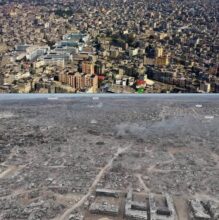
“WE WANT TO STAY”
Silvia Boarini
Ahlam Khalil, 19, rejects the future that the Israeli government has laid out for her.
“We want to stay. The government is trying to take from us all that we love. How do you think we will feel? It will be the hardest thing to face,” she says, sitting on her porch in the Bedouin village of Atir in the Naqab desert in the south of present-day Israel.
Following more than a decade of litigation, the Israeli high court ruled in May last year that the state is legally authorized to demolish Atir along with neighboring Umm al-Hiran.
Atir will become an extension of the planted forest of Yatir, while Umm al-Hiran will become the Jewish settlement of “Hiran.”
Unrecognized
The villages, their populations totaling approximately 1,000 inhabitants, are two of approximately 40 Palestinian Bedouin communities in the Naqab, which Israel calls the Negev, that are not recognized by the state and do not receive basic services such as water or electricity.
In many cases, these villages pre-date the State of Israel. In the case of Umm al-Hiran and Atir, its residents were forcibly transferred there in 1956 by military order from their original village of Khirbet Zubaleh, “which they had cultivated for centuries,” according to the rights group Adalah.
The government has been accelerating development in the Naqab. New roads, industrial zones, military bases and railway lines are being built to transform this once marginalized region into an “Israeli Silicon Valley.”
Forcible transfer
But these plans aren’t to the benefit of indigenous Bedouin communities. Adalah’s Suhad Bishara says that “most of [Israel’s] development plans are directed to bringing Jewish communities to the area, especially in the Naqab.”
Instead of providing them with badly needed services, in recent years the Israeli government has sought to forcibly transfer tens of thousands of Bedouins living in unrecognized communities in the Naqab — a scheme known as the Prawer Plan.
Mass protests scuppered this plan, but Adalah says that the high court ruling on Atir and Umm al-Hiran “gives the state broader legal scope for destroying these communities.”
And so residents like Ahlam Khalil insist on recognition — not demolition.





